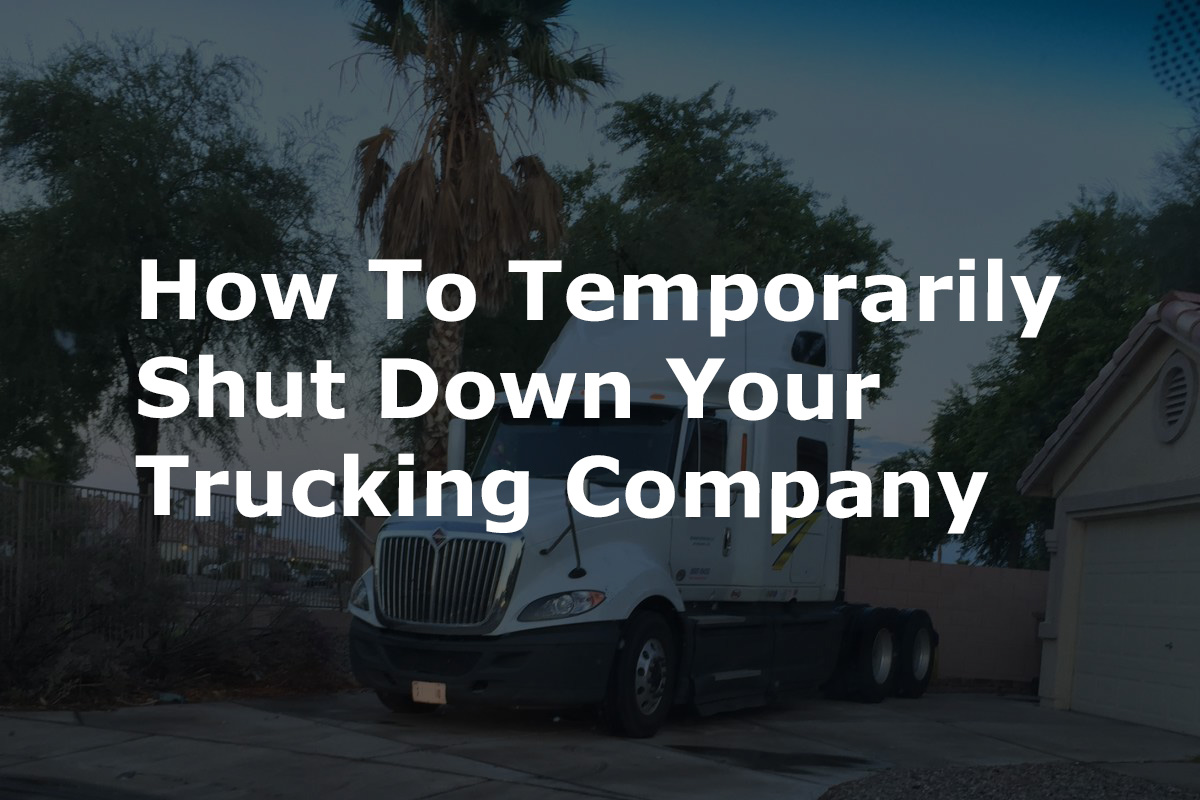With trucking jobs evaporating and fears of a deep 2023 recession, many owner-operators and small fleets may be struggling. In the past year alone, we are seeing a high amount of trucking companies close their doors due to financial strain.
In fact, the trucking industry lost 11,400 for-hire trucking jobs in September, according to payroll data released Friday by the U.S. Department of Labor. This was the largest decrease since April 2009 if you exclude the April 2020 COVID reaction.
“It suggests that small fleets are folding and/or fleets are right sizing,” said Bob Costello in a tweet, the chief economist for the American Trucking Associations.
With pain on the horizon, many carriers take a break and sit out of the trucking game until freight rates and demand improves.
If you are considering sitting on the sidelines, there are right and wrong ways to shut down your business.
So, what should you do to shut down your trucking company if you hope to come back in a few months?
Keep your operating authority if temporarily shutting down
As a carrier your greatest asset is your trucking authority or Motor Carrier (MC) number.
Instead of completely closing your business, you can keep your authority active, so it is easier to come back or lease owner-operators in the future. This makes the most sense if you plan on shutting down for less than 12 months.
In this scenario, insurance filings are required to maintain active operating authority. But you do not need to keep your full insurance.
For example, you may have $1 million in primary liability, which costs $2,000 per month or more for one truck and have $100,000 in cargo insurance.
If temporarily shutting down and not planning to haul freight, you can reduce primary liability insurance to the minimum $750,000 and remove cargo insurance coverage.
This could reduce your monthly insurance rate closer to $1000 per month to keep your authority active.
You can consider this as a temporary investment so you can quickly come back whenever the market improves, or you lease on owner-operators.
For example, you pay $5,000 in insurance to keep your authority going for 5 months. Then you start leasing on owner-operators under your still active authority. If you charged 20% and your leased owner-operators make $10,000 in a week, you made $2,000 during that time and can quickly recoup the 5 months you were temporarily closed.
If you have further questions, contact our commercial trucking insurance branch, CNS Insurance.
When it comes to permits and vehicle registration, we often recommend trying to temporarily shut down as close to the renewals process to limit the loss of any fees. If you are planning to be out for over a year, then do your final filings and don’t renew as the start-up process is simple. Most states will want you to turn in your vehicle plates, but your account is always still there to add a vehicle back on when you come back.
For your truck and trailer insurance, if you still owe money or have a loan on your equipment the banks will not allow you to reduce payments or drop that insurance.
On the other hand, if own your truck and trailer, you could scale back the equipment insurance while you are not using it, just make sure there is a non-trucking policy on it if it sits and randomly gets damaged.
What do I do if totally shutting down trucking company?
If walking away totally, there are several steps to avoid big fines.
First, go to FMCSA website and voluntarily revoke your operating authority. This will have to be notarized.
You must do this before canceling your insurance. If you don’t take this first step and simply walk away, then it will be considered an involuntary revocation of authority. A voluntary revocation looks much better if you ever decided to restart your authority and it will also make the process of restarting easier.
For the BOC-3, you do not need to do anything. It will always be there unless the annual renewal fee was not paid.
Next, fill out the MCS-150 to update and check the box that you are “out-of-business” as the “Reason for Filing”, and complete items 1-16, 30 or 36 and 31 or 37. If these items are missing, the form will be rejected.
Then, withdraw from your drug consortium.
When it comes to your IRP and IFTA accounts, you will need to cancel the IRP in your home state. You will also need to cancel IFTA, but you will still have to file returns at end of quarter or face future fines. When filing your last quarterly IFTA report, select that you are Ending Operations or Final Returns.
Similarly, your state accounts (NM, NY, KY, OR) also need to be canceled and file your last quarterly report, noting that this is your final return or ceasing/ending operations. If you do not file, they will also eventually fine you.
For UCR, just don’t renew it when it comes up for renewals.
If you paid the annual 2290 HVUT fee, which is $550 for the year, a portion is refundable if you are shutting down. However, if you lease the truck on elsewhere, you could keep HVUT without paying the fee again.
Lastly, you can cancel your insurance. If you are keeping your truck or trailer, make sure to keep enough insurance to not get the finance company on your back about dropping insurance or if just taking the truck and trailer to a new carrier, make sure it is insured with the new carrier before cancelling your current insurance.
As you can see, there is a lot involved in setting up as well as fully shutting down or temporarily shutting down your trucking business. CNS is a one stop shop for all these services, including commercial insurance, and will be able to make the best recommendations for you, no matter where your trucking company stands.
If you have any questions or concerns, please call us at 800.724.5523 or email info@cnsinsures.com, or contact our compliance and licensing team at 888.260.9448 or info@cnsprotects.com.






